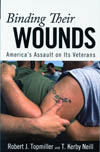 More than a few books have gone over the not-exactly-sterling record of how America’s veterans have been treated after returning home from the nation’s wars. Very many more have focused on the raw deal that Vietnam veterans received from their government, from the old-line veterans’ organizations and from the American public in general after coming home from America’s most controversial overseas war.
More than a few books have gone over the not-exactly-sterling record of how America’s veterans have been treated after returning home from the nation’s wars. Very many more have focused on the raw deal that Vietnam veterans received from their government, from the old-line veterans’ organizations and from the American public in general after coming home from America’s most controversial overseas war.
Binding Their Wounds covers this well-trod territory, with well-presented chapters on post-traumatic stress disorder, the failings of the Veterans Administration, Gulf War Syndrome, the health consequences of Vietnam veterans’ exposure to Agent Orange, and of World War II veterans purposely exposed to radiation, the so-called “Atomic Veterans.” These chapters are well-researched, well-written and well worth reading.
But what makes this book unique—and valuable—is the compelling personal story of Robert J. “Bob” Topmiller, the former Navy corpsman at Khe Sanh who went on to become a college professor, author and fervent advocate for the Vietnamese victims (especially the children) of the American war. Bob Topmiller, who was haunted by his experiences in Vietnam, committed suicide before he finished this book; his friends and colleagues, led by clinical psychologist and Navy veteran T. Kerby Neill, completed Binding Their Wounds as a tribute to Topmiller’s life and work.
Bob Topmiller joined the Navy at 17 and signed up to be a hospitalman, not realizing that that job meant serving as a Marine combat medic. He landed in Vietnam on January 12, 1968, and arrived at Khe Sanh the same day, nine days before the infamous siege began. The teenaged corpsman survived the carnage, but ministering to dead and dying Marines for 2 1/2 months affected Topmiller for the rest of his life.
Topmiller came home from Vietnam, married, had three children (Note: Robert Topmiller had four children; see his widow’s note in Comments below.) Hand worked as a department store manger for 15 years in Idaho. Then, in 1991, at age 42, Topmiller enrolled as a full-time college freshman. The middle-aged student received his B.A. and M.A. in history, specializing in the Vietnam War. He went on to earn a Ph.D. at the University of Kentucky, studying with the one of the nation’s top Vietnam War specialists, George Herring (America’s Longest War), who wrote the book’s foreword.
Topmiller’s dissertation, “The Lotus Unleashed: The Buddhist Peace Movement in South Vietnam 1964-1966,” a pioneering study of the Buddhist peace movement and its impact on the U.S. intervention in Vietnam, was published in 2002, after he had become a history professor at Eastern Kentucky University. His next book, Red Clay on My Boots: Encounters with Khe Sanh, 1968 to 2005, came out in 2007. In it, Topmiller recounted his time at Khe Sanh and his 11 subsequent trips back to Vietnam. Bob Topmiller was working on Binding Their Wounds, which he intended to be a stinging indictment of the Veterans Administration (which, in part, it is), when he committed suicide in 2008.
Topmiller went back to Vietnam four additional times after his memoir came out—testament to his obsession with, as his colleagues note in the book, “the impact of the war on civilians and soldiers on both sides of the conflict.” He became especially concerned about Vietnamese children, and worked long and hard to support a medical orphanage run by a Buddhist nun for children with Agent Orange–caused birth defects.
He empathized with the Vietnamese veterans he fought against and he also supported Buddhist dissidents in Vietnam, despite threats from Vietnamese security forces.
Binding Their Wounds is a tribute to Bob Topmiller’s service to his country, his pioneering academic work and his dedication America’s veterans and to working for peace in this country and in Vietnam.
Paradigm, 2011
This review appeared originally in the August 2011 issue of Vietnam magazine.




